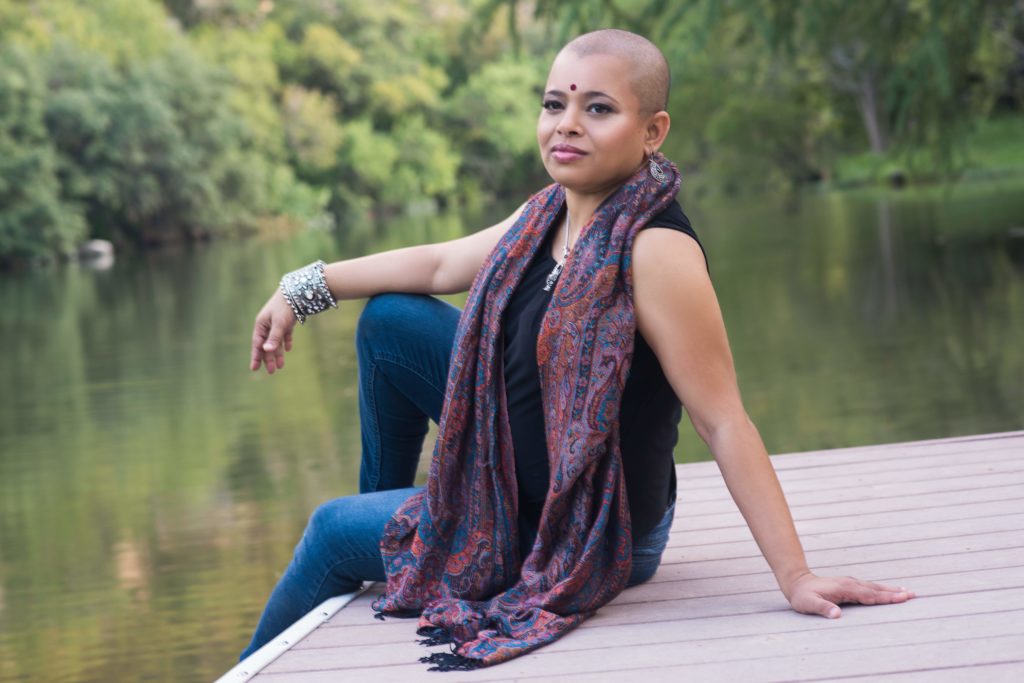Nagavalli brings Indian devotional music to Austin, with a country twist.
By Brianna Caleri, Photo by Sadu Bajekal

In January, singer/songwriter Nagavalli released Immersion, an album of continuous meditative music that blends Indian devotional traditions with Western elements, including piano and pedal steel. Lyrics on Immersion borrow Sanskrit texts from saints as far back as the 14th and 15th centuries and honor kirtan and bhajan styles with call-and-response and intricate, emotional poetry.
The Austin-based singer was included among the Top 10 Female Vocalists and World Artists at the 2015–2016 Austin Music Awards and recently performed following the Women’s March.
Austin Woman met with Nagavalli to discuss her unique take on organic cultural fusion and how her experiences growing up in Mumbai, India, and living in Austin spark musical creativity.
Austin Woman: Do you think the balance of East and West in your music reflects the balance of your life experience, or is it more of an aesthetic blend?
Nagavalli: I think it is more how I have lived. Growing up in Mumbai, I was in a cosmopolitan but traditional environment. I actually write in English because it’s the language I write lyrics best in. And the Eastern Indian melodies were how I trained in voice. My exposure to Western music was limited, but it was more through pop music—some records that my father had at home. Naturally, when I started writing melodies, this is how they came out. I initially tried to make it sound Western and it just didn’t make sense.
AW: What does Immersion mean to you?
N: I recorded it to be a tranquil, meditative album. It’s also a back-to-roots album for me; this is where I come from. This is my background. I always knew after the first album that this would be a follow-up album. It’s more traditional and pretty musically involved. So, I wanted to show some of the intricacies of Indian music.
AW: How does your family support you?
N: They were all here for my CD release at the One World Theatre. My brother and a couple cousins actually flew in from different parts of the country and my mom, from India. They’ve always been very proud, especially my mom. I think in some ways, it’s almost her dream because she just loves music and singing.
AW: Other artists in Austin are so captivated by the unique spirituality in your music. How do you think you access that?
N: I think the style of music itself has a certain value, especially when I’m doing the Indian vocalizations. It’s very aesthetic. I initially didn’t know how to react sometimes when people would be in tears. Do I feel proud about this? As I’ve gotten a little older, I’m just honored to be able to connect with somebody at that level. When I’m performing, I try to be authentic and be in the moment. It takes a second sometimes. Maybe there is something in that that grabs people.
AW: How does your experience as a woman factor in to your craft?
N: My music is mostly about internal worlds. There’s a song called “Clarity” talking about trying to find one’s own soul instead of trying to please people around you. There’s “Runaway,” which talks about being in a bad situation and [asks,] “Why do you keep going back?” And the song I spoke about after the Women’s March was titled “I See You.” It was a song that I wrote around the #MeToo movement. Just by the nature of being a woman and being between these two cultures, my songs automatically speak to that. I don’t make a conscious effort to write any women-centric songs; it just happens.
AW: Is there a venue in Austin where you feel at home, one that feels accepting of fusion and different cultures?
N: I played One-2-One, Cactus Cafe, Central Market, the old Strange Brew. There are a lot of venues that I like to go and play at and I feel pretty comfortable. I do wish there was a broader choice in general for musicians in this town. One-2-One has been really open to bringing in different kinds of artists. And I absolutely love Cactus Cafe. That’s a very sweet spot for me.
AW: How do you think artists can fuse cultures in a respectful and responsible way?
N: I honestly think that music doesn’t have boundaries. Being authentic and honest in the art that you’re creating is important. If you’re purely grabbing something from another culture that you have no connection to so that you can make a dime, that’s what offends my senses. What bothers me more than anything anyone can do musically is when people use iconography incorrectly. They’ve taken om or something and put it on an anklet, and that’s disrespectful. At least find out what’s the right way to present it and show respect. People have been assimilating different styles of music for a long time. If you think about it, that’s how contemporary music evolves. It really doesn’t have any boundaries.

